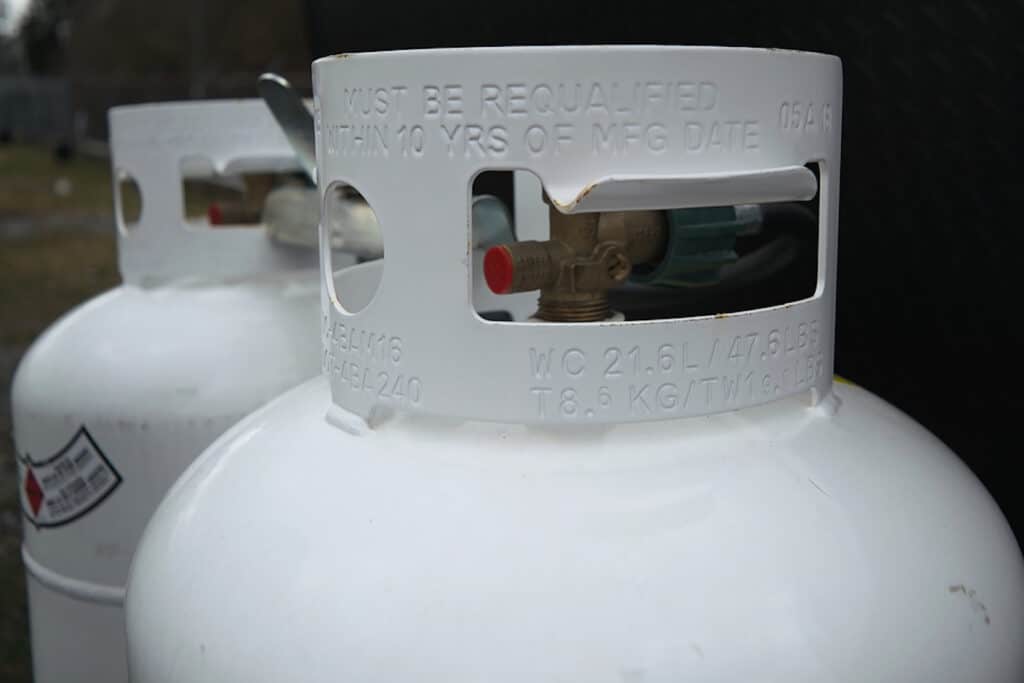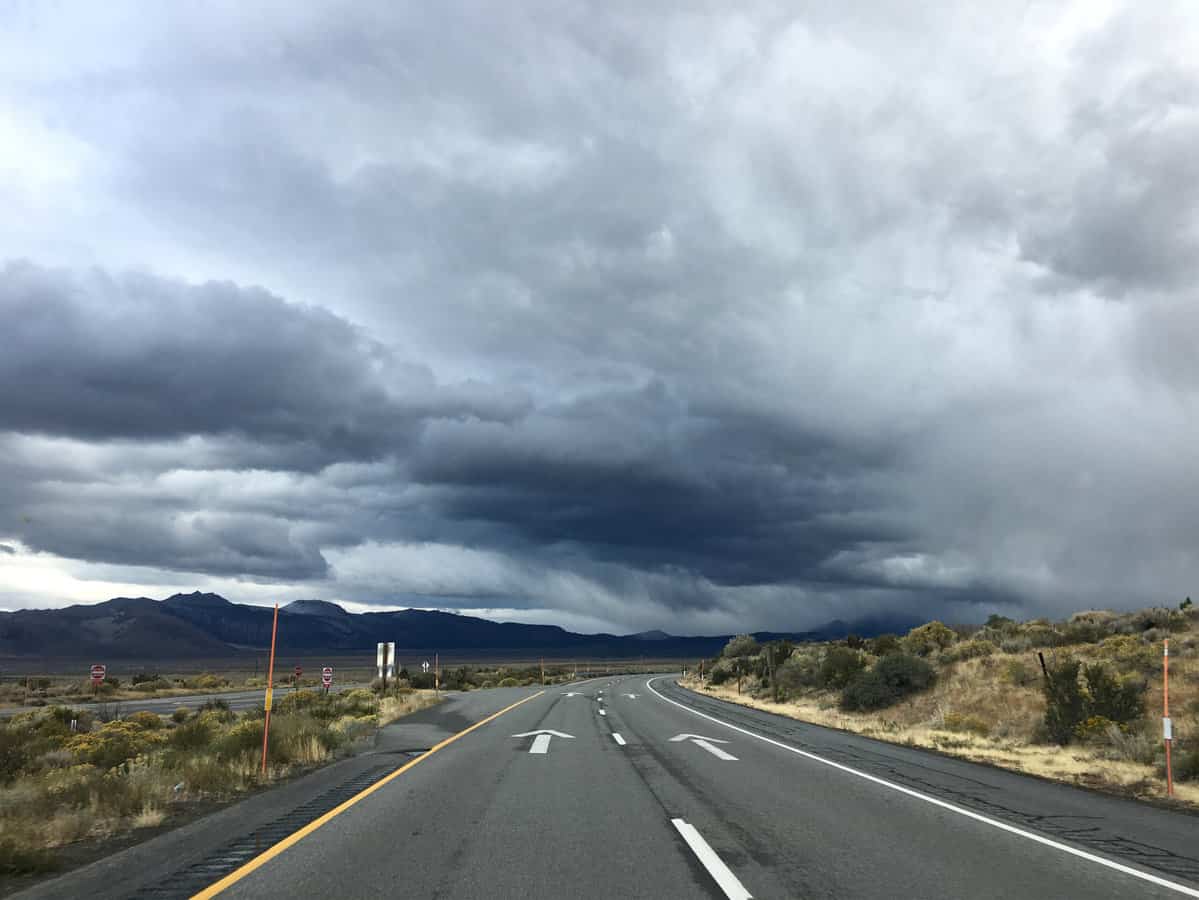
How Cold Does It Have To Be For Propane To Freeze?
We love winter camping in our RV. The RV provides a warm and cozy refuge from the cold after a day of skiing, snowboarding, tobogganing, or ice fishing.
This is largely due to the heating power of propane. Not only does the warmth of a blue propane flame make our RV nice and toasty, but we can use it for other things too. We use propane to cook and heat beverages on our RV stove.
When we run our RV refrigerator on propane, we can save our DC power for lights and other vital things. But that’s not all propane does for us. We even use propane to power our generator when we can’t connect to shore power. Sometimes we worry about what would happen if our RV propane tanks froze during a winter camping excursion.
In this article, we’ll look into what it takes to freeze RV propane tanks. Of course, we’ll also dive into what you can do to keep your propane flowing and your tanks warm when it’s really cold out.
Does propane freeze?
Let’s start by saying that yes, RV propane could technically freeze. But it would have to be really, really cold for that to happen. How cold? Propane reverts to a liquid state at -45ºF (-43º C). But it has to get even colder than that for propane to freeze.
The freezing temperature of propane is -306.4º F (-188º C if you’re in Canada). It’s never been that cold on earth that we know of. However, that doesn’t mean that freezing temperatures don’t cause RV propane tank problems.
The most common propane problem when it’s cold out
The biggest problem with RV propane when it’s cold out happens when your furnace just doesn’t produce enough heat to keep your RV warm. The problem is probably not with your furnace at all. Let’s have a look at what’s happening.
The colder propane gets, the fewer BTUs it can produce when it burns. By the way, BTU stands for British Thermal Unit, which is a measurement of the energy it will take to raise the temperature of one pound of water by one degree Fahrenheit.
For RVers, this means the furnace burns propane less efficiently to heat the inside the RV. The result can be that your RV furnace struggles to create warm air and your RV doesn’t warm up as much as usual.
The answer to this problem lies in keeping the propane tank warm. A cost effective solution is simply wrapping your propane tank in a blanket or a small heated throw. To keep the blanket or throw in place, you can secure it with a bungee cord.
Of course, there are specialty products on the market that do this too. You could also use a propane tank heater, which is specially designed to fit propane tanks and bring them up to optimal temperature.
One of the best parts about RVing is engaging with the community of traveling enthusiasts. iRV2 forums allow folks to chat with other RVers online, and get other perspectives on everything RVing, including products, destinations, RV mods, and more.
Related articles:





I lived in my 5th wheel for ten years in Northern Alberta when I worked in the oil sands. Every winter it got down to minus 50. I had four 50 lb. tanks hooked up in a header to the trailer. I had a tarp that covered the front end of the trailer from the hitch to the ground, which helped protect the tanks from the wind and blowing snow. I never had to worry about the propane from freezing, it was when I ran out of propane was the issue. About 3 weeks I could go, but if it was really cold i had to refill the tanks sooner. The only problem I had was when my furnace crapped out on me on the coldest day, then it was fun getting everything running properly when the furnace got fixed. I had the trailer well insulated around the bottom to which that helped allot. I was warm as a bug in a rug, plus I used a heater inside also to help with the heating. Everything ran pretty good all winter in that cold.
Most campers using propane at cold temps or high altitudes have complained about the regulators freezing. Minute drops of water in the propane can freeze and restrict the flow of propane. Keeping the regulator warm usually solves this problem. I use a 120VAC incandescent 100 watt bulb lead light placed under the regulator to keep it warm during freezing temps. Propane is my backup power for furnace and fridge in case of electricity failure.
Our portable 5 gal propane tanks froze during the hard freeze in Texas 2021. I thought I was smart running a large generator on propane instead of gasoline for both me and my neighbor. An hour in the generator cut off. I shook the tank to see if it was full and could hear ice jingling inside. Switched to a warm tank but again after an hour it froze and left us without heat and electricity. Wrapping the tank in regular blankets did nothing to get it flowing. We were running a heavy load on the generator. I’m sure someone smarter than me can chime in on the law of thermodynamics. My guess is the rapid draw of propane must have made an endothermic(?) reaction which dropped the tank temp below propane’s freezing point. Kind of the same principle as your HVAC. Or maybe it was water like another poster mentioned. If I have to do it again I’ll leave some energy for a heating blanket on the tank.
If you purchase propane in a warm climate and then use it in a cold climate it may not vaporize enough to property support your usage. Propane is a mix of gases that vaporize at different temperatures to minimize the over pressure in different temperate zones. If you are going to be using your propane in a cold climate purchase it in a cold climate so you have the proper mix of gases to vaporize at the lower temperature
We needed a heated discharge hose. It froze for 5 days. No showers or hot water.
How does a blanket or throw help keep a tank warm? When propane is being released or used the tank gets colder – colder than the ambient air. All this does is slow the heat transfer thus taking it longer for the tank to recover to ambient temperature – unless there’s a heat source.
Your regulator can definitely freeze up.
The propane itself does not ‘lose’ btu’s. It loses the ability to keep the tank pressure up, and as a result, the required pressure to properly supply the appliances with sufficient to operate.
Just to clarify, propane ALWAYS had the same BTUs, regardless of temperature. The issue isn’t with the propane, but with the vaporization of the fuel from a liquid to a vapor. Propane is stored under pressure in a liquid form. As you draw off pressure the liquid vaporizes to produce more pressure. This takes heat calories to do that, and as it fills the liquid it gets to the point where can’t keep up with demand, and will eventually stop producing vapor.
Actually just putting a blanket without additional heat is a worse situation. Propane is a liquid inside the tank and requires heat to evaporate it to a gas. If you restrict heat from entering the tank , it will get colder and colder with less evaporation until at -44F there will be no gas formed. So external heat is your best bet.
Propane wont freeze but Butane will. That why they don’t sell it up north.
Just announced by the Biden white house today, they want to outlaw gas stoves nationwide! Puts too many gases into the air we breathe. Rv’s and homes will have to go electric as our cars! Check out the news reports.
Actually Biden is against banning gas stoves. What some states are mandating is that no new buildings would be retrofitted with gas piping so that we can slowly change over to renewable energy rather than fossil fuels.
Hope that helps.
Gas, not propane and only new building installation. Don’t spread false information just to make the government look bad
They do a good enough job screwing up on their own.
They are bad don’t have to try to make them look bad they do it on there own
That’s right they do Enough to make them self’s look bad we don’t need to help
I don’t think that will ever happen in our lifetime. It said that they want to. That doesn’t mean that it will happen. I’m 63 years old. I have lived with a propane or natural gas furnace and or stove. My entire life. And it hasn’t affected me in any way. Or anyone else that I know of.
With all due respect, it’s this kind of knee-jerk reacting that needlessly inflames the lunatics of an already failing country. Do your own research people before believing any rants. ..Please. There’s no gas-stove banning attempts going on.
Oh, and more to the point of this article, while I haven’t utilized a [heated] propane tank blanket yet, tho boondocking in sub-zero temps, the trick with your propane supply is to keep your tank full – more head pressure results in proper vaporization resulting in nice use of those BTUs. 😉
To Gary and everyone, have a safe, and warm, New Year.
As far as I am concerned, he can shove that idea where the sun does not shine!
So, No then.
Have you ever heard of the state of Alaska ?
It’s a state that’s way north of California !
Temps in Alaska during winter , regularly dip into minus ‘ 45° ‘ or colder , so this is the realm of Liquid Propane Freezing to a solid
” So Yah ” propane can freeze , read the complete article , moron
Be nice
Nope
I must’ve missed it what’s the temperature when I need the blanket?
Where do I start? You quit when the subject treatment was half done. When propane gets really cold, the vapor pressure goes down so you have less pressure entering the regulator. If it gets really cold (-40) you may not have sufficient pressure to operate some heating systems. I don’t want to be in an rv at -40! I doubt the heat capacity of propane is more than a few btu/ lb so heated the fuel is a very minor component of operation. If an rv furnace can’t keep up its because the rv is not well insulated.
Propane in storage is a liquid. To get the propane gas that is needed to burn, the liquid must boil. The colder a propane tank gets the less propane gas is produced. The btus in the propane gas remain the same however. It is possible that a 20 lb tank will get cold enough that it will not produce enough gas for a a high capacity appliance like a furnace. Heating a tank will help but heating the tank to much could over pressurize the tank which could be explosive. The recommended solution is to increase the size or number of tanks.
Propane also freezes if there is water in the tank. This happened to me and the propane company had to add a chemical to absorb the water